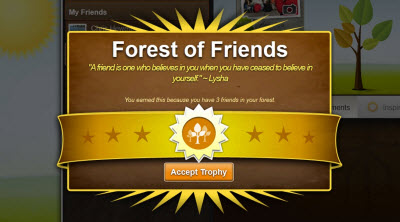 Most games can be time sinks, stealing time away from the things that you’re supposed to be doing. But Mindbloom is the kind of game you can feel good about playing. It is a simple game aimed at improving your quality of life by rewarding you for doing the things that are really important.
Most games can be time sinks, stealing time away from the things that you’re supposed to be doing. But Mindbloom is the kind of game you can feel good about playing. It is a simple game aimed at improving your quality of life by rewarding you for doing the things that are really important.
 The idea is to grow the life you want by thinking about it a few minutes a day, said Chris Hewett, a former game developer and co-creator of Mindbloom. The Mindbloom Life Game is aimed at inspiring people to define what is important to them, discover what motivates them, and to take meaningful daily actions in all areas of their lives. It’s an example of the gamification trend, which uses game-like mechanics in non-game applications. But in this case, Mindbloom’s aim is to gamify life itself.
The idea is to grow the life you want by thinking about it a few minutes a day, said Chris Hewett, a former game developer and co-creator of Mindbloom. The Mindbloom Life Game is aimed at inspiring people to define what is important to them, discover what motivates them, and to take meaningful daily actions in all areas of their lives. It’s an example of the gamification trend, which uses game-like mechanics in non-game applications. But in this case, Mindbloom’s aim is to gamify life itself.
Seattle-based Mindbloom got its start in 2008 when Hewett decided he had been working too hard on making video games. He was a former executive producer in the video game industry, having worked on titles such as No One Lives Forever, Tron 2.0 and F.E.A.R. It was a very intense career with no time for breaks.
“My life was completely out of balance, Hewett said in a in interview. “It was only after the birth of my first son that I knew something had to change. I got healthy, and got back on track with more balance in my life.”
Upon finishing the last game, F.E.A.R., an industry bestseller, he helped take care of his son more and his wife went back to work. He decided to set up a new company built around a game that inspired people to make similar changes in their lives. He teamed up with Brent Poole, an early member of the Amazon team who’d also had to work 60 to 80 hour work weeks in the past. They gathered a team of gaming, tech, and behavioral science experts. Poole became CEO.
“I recognized that there are millions of people who wanted to improve the quality of their lives and struggled with it,” Hewett said.
But the usual way to make such changes were through antiquated self-help books or videos. These were expensive, time-consuming, and uninspiring.
“Coming from the game industry, we thought we could do a lot more,” Hewett said. “We created a game that focuses on your entire life. It’s about discovering your core motivations and taking personal steps to transform your life.”
The game helps people decide what matters most by using the metaphor of a “life tree,” pictured at top. That tree is a visual representation of your priorities and progress in matters such as health, lifestyle, career, creativity, relationships, finances and spirituality. The user progresses by interacting with different parts of the tree and its elements such as branches, leaves, a forest, the sun, rain, and even a dragonfly. The app can tell you at a glance if your life is on track.
 “The tree represents the life that you want,” Hewett said. “The sun represents inspiration and the rain is about daily actions.”
“The tree represents the life that you want,” Hewett said. “The sun represents inspiration and the rain is about daily actions.”
You keep the tree green and healthy by creating a simple action plan that encourages them to live the life they want. You can choose your own activities from a list of 500 that Mindbloom recommends, such as substituting water for soda, taking the stairs to the office, cleaning one room each day, checking in with your parents, thanking a friend, smiling at a stranger and more.
You can choose from a gallery of free inspirational media or create and share your own. You are encouraged to share beautiful photos, inspiring music downloaded from iTunes, and uplifting quotes. User can act alone or in a social group via instant messages, Facebook, Twitter and other social tools.
The game offers rewards for offline actions. You complete daily actions to form new habits and can track your progress online or on your mobile phone. You can get achievements such as “seeds” and badges and can level up. You can spend those seeds to expand your image galleries and music playlists and to get Life Area Action Packs, which provide you with additional actions and images in specific life areas. The game maker has tried to make the game compelling by making it emotive.
Tommy Laflamme, a research grant manager who has been using the Mindbloom public beta for a year, said he has improved his relationships with family and friends. He speaks with his mother on a weekly basis and has deeper relationships with friends, because Mindbloom prodded him to do so. Hewett anticipates that people will use the application on an ongoing basis.
Kyra Bobinet, a medical director at Aetna, a major health insurance company that will offer Mindbloom to a select group of members next month, said that Mindbloom puts the principles of behavioral science behind social gaming to inspire people to achieve better health. She said the interface is easy-to-use and is visually and psychologically appealing.
 The Mindbloom Life Game is available for free on browsers as well as Android and iPhone devices. Users can purchase a GrowPro package for $34 until Nov. 1. After that, it will cost $89 for a lifetime membership. The Mindbloom Life Game is similar to Lance Armstrong’s LiveStrong nonprofit. But instead of focusing purely on nutrition and exercise, Mindbloom goes beyond health-related topics to focus on things such as creativity and relationships that contribute to a balanced life. Mindbloom is focused on the parts of our lives that we can directly change.
The Mindbloom Life Game is available for free on browsers as well as Android and iPhone devices. Users can purchase a GrowPro package for $34 until Nov. 1. After that, it will cost $89 for a lifetime membership. The Mindbloom Life Game is similar to Lance Armstrong’s LiveStrong nonprofit. But instead of focusing purely on nutrition and exercise, Mindbloom goes beyond health-related topics to focus on things such as creativity and relationships that contribute to a balanced life. Mindbloom is focused on the parts of our lives that we can directly change.
The company has 11 employees. Rivals include Keas and StickK. Mindbloom is differentiating itself by focusing on the science behind behavior change, integrating technology, game mechanics, art, and human psychology for the sake of personal growth. It tries to focus on intrinsic motivations, such as your own personal drive, and not extrinsic motivations, Poole said.
Mindbloom has raised $1.8 million from Seattle-area angel investors. With Aetna, Mindbloom has a co-marketing, multiyear agreement that could be worth multiple millions of dollars to Mindbloom. During the customer beta test, consumers have made 1.3 million personal commitments with a 75 percent success rate on following through on a daily basis. And during the public beta, the company acquired 15,000 members.
“We think we’re getting into a period of rapid growth,” Poole said. “We think we’re doing something that nobody else is doing.”
VentureBeat's mission is to be a digital town square for technical decision-makers to gain knowledge about transformative enterprise technology and transact. Learn More
